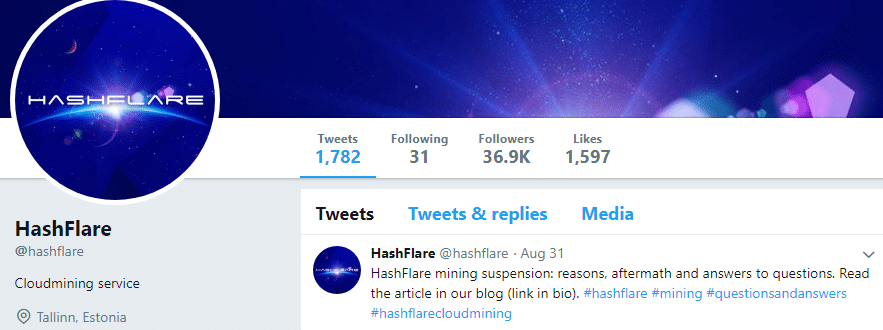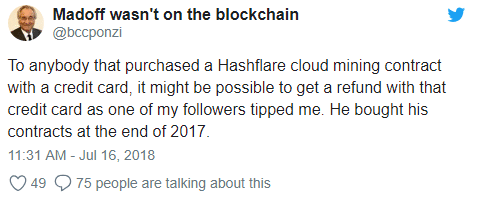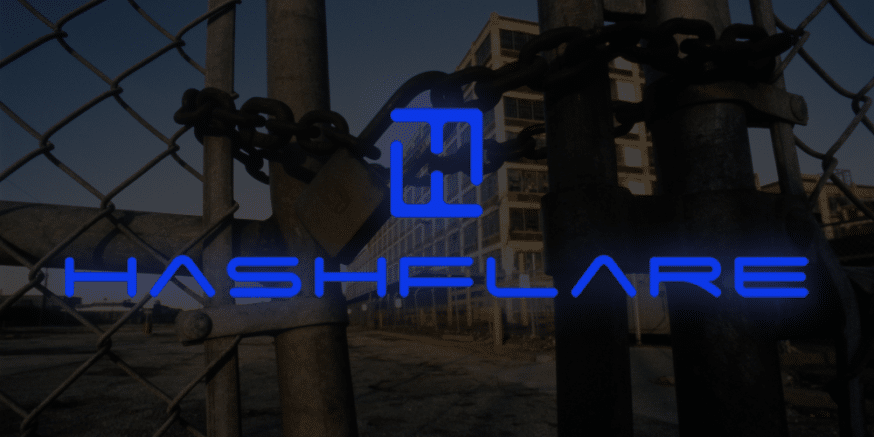- HashFlare Keeping Crypto Using KYC Laws
- What is HashFlare's Mining?
- Problems with Bitcoin Mining
- Users Strike Back
- Corporate
- HashFlare’s Troubling Future
- Cloud Mining Scams
- HashFlare’s Brand Will Never Be the Same
In an unusual turn of events, the popular cloud mining site HashFlare suspended all Bitcoin mining operations on its platform. The news came via a Twitter post on July 24 where HashFlare developers explain that the company had suffered significant losses since the beginning of June 2018. The post goes on to explain that the related maintenance and electricity costs associated with Proof-of-Work mining SHA-256 contracts are no longer lucrative to the company.
HashFlare contract holders received notification via email regarding the cancellation of their policies. Since the dissolution last month, new reports are emerging that question the validity of the cloud mining services HashFlare supplied consumers. In particular, users claim that their contracts were canceled without the remaining balances being refunded. In response, company officials stated that their contract includes a clause that allows HashFlare to undertake such a questionable maneuver, and that users agreed to these actions when they signed up for their services.

Another troubling decision made on the part of HashFlare’s development team was the choice to suddenly, and without warning, institute new withdrawal requirements. These newly instituted requirements have left many crypto investors battling to get access to their funds. The new withdrawal procedures include requiring users to meet strict know your customer (KYC) compliance procedures. KYC laws are customary in traditional banking scenarios, but recently, they have been used in more nefarious ways by crypto exchanges.
HashFlare Keeping Crypto Using KYC Laws
HashFlare appears to be using a troubling tactic to hoard user’s crypto. CoinCentral was one of the first organizations to report on the disturbing trend of crypto exchanges utilizing know your customer (KYC) laws to prevent users from withdrawing their funds. Users were not required to meet these regulations while making deposits during the opening of their accounts. Only upon withdrawal do users find themselves forced to comply with the newly instituted KYC protocols.
The implementation of this shady business tactic led many HashFlare users to hit social media platforms to express their disdain for the company’s new strategic crypto grab. Already, Reddit users opened multiple pages dedicated to battling the company’s decision both online and in court. The problem with the latter choice is that users must reveal their identity to take the company to court, and many crypto investors hold their privacy dear to their heart.
The momentum behind the class action lawsuit movement grows every day. Twitter users have taken to HashFlare’s account to alert others to the planned actions and explain to them how they can get involved in the lawsuit. Many users are comparing HashFlare’s maneuvers to the now-defunct Bitconnect scam that rocked the cryptomarket earlier in the year.
What is HashFlare’s Mining?
The HashFlare cloud mining service allows users to rent processing power (hash) and use it towards mining Bitcoin and other cryptocurrencies. Users purchase a yearly mining contract from the firm. This investment supposedly covered the equipment, personnel, and operating costs of the firm’s mining rigs. HashFlare told clients that it operates these mining rigs on their behalf with all of the profits divided based on the hash power rented.
Problems with Bitcoin Mining
Problems arose for HashFlare when the cryptomarket continued to decline. The firm quickly realized the error in their ways. Troubles started once their fixed operating costs began to exceed the value of Hashflare’s Bitcoin rewards. This month-long loss of funds allowed HashFlare to institute an obscure contract clause that enabled the firm to cancel all Bitcoin contracts without providing users refunds for the time remaining on their agreements.

In other words, some people paid HashFlare for a cloud mining contract in June, and in July, the company canceled the contract and kept the user’s payments under this clause. Once you combine the cancellation clause with the institution of stricter withdrawal requirements, it becomes evident that the firm has ulterior motives in play.
Users Strike Back
HashFlare users are not planning to step aside and let the firm take their crypto. On top of the growing class action lawsuit, users are posting multiple different strategies to get refunds. One user, in particular, shared with the crypto community how he was able to get his Bank of America credit card refunded. The user contacted the bank and disputed the charges as fraudulent.

Corporate
Estonia-based HashFlare entered the mining scene in 2016. HashFlare also lists an Edinburgh, Scotland address on their company information page. HashFlare developers originated from the HashCoins camp. The firm quickly grew into a significant cloud mining platform over the last twelve months. According to HashFlare’s website, the firm successfully provided services to over 2,500,000 users globally.
[thrive_leads id=’5219′]
The company utilizes a combination of high powered mining rigs from Bitmain, Bitfury, and Inno3d, to name a few. The company’s official policy is to make crypto mining accessible to anyone, regardless of their technical knowledge.
HashFlare’s Troubling Future
HashFlare has responded to these allegations of fraud. They are looking into ways to reinstitute Bitcoin mining on their platform in the coming months. This empty promise may not be enough to turn the angry users back into potential mining clients. But HashFlare hopes that they can somehow appease the masses.
Cloud Mining Scams
HashFlare managed to gain a reputation as a respectable cloud mining operation over the last year. These latest moves have many crypto investors worried that the company might take a turn for the worse. Cloud mining scams have become more prevalent in the crypto space over the last year. To avoid these pitfalls, you should research any potential cloud mining operation vigorously. Be wary of companies offering guaranteed returns on your investment. Remember, the crypto market is volatile, and nobody can predict its future movements with one hundred percent certainty.
HashFlare’s Brand Will Never Be the Same
It now appears that it could be a rough ride for both HashFlare and its users. HashFlare was considered a legitimate operation in the cloud mining sector. These new allegations bring that validity into question. When you think about the effects of the company’s decision and that the platform handles multiple cryptocurrencies, it is hard to imagine a scenario in which HashFlare doesn’t lose face in this situation.
Never Miss Another Opportunity! Get hand selected news & info from our Crypto Experts so you can make educated, informed decisions that directly affect your crypto profits. Subscribe to CoinCentral free newsletter now.










